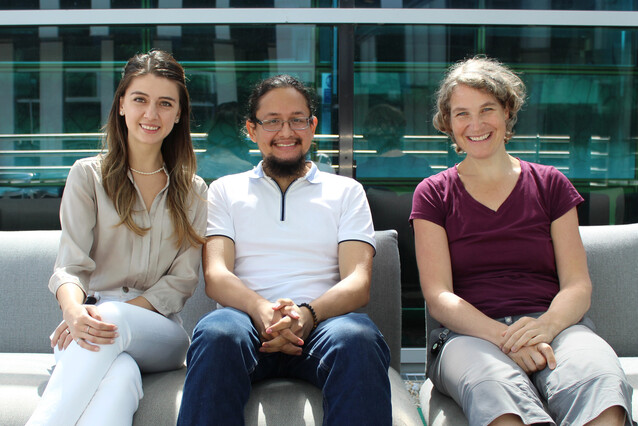An internship program for Salvadoran students at the IMP
For the past two months, the lab of Andrea Pauli has been working with an exceptional intern. In June, Eduardo Isaac Martinez Barrios, a bachelor’s student in his fourth year at the University of El Salvador, joined the IMP for an internship to lead his first research project. His stay stems from an initiative led by Salvadoran postdoc Victoria Deneke, who wanted to give one of her co-nationals a chance to experience hands-on research.
“One of the key determinants of success in science is to have access to education and resources for research. Many brilliant students around the world don’t have these opportunities because of the socio-economic context they come from,” says Victoria Deneke, a postdoc in the lab of Andrea Pauli.
Victoria was born and raised in El Salvador in Central America, a country that struggles with high rates of poverty, inequality, and violent crime. Many Salvadorans cannot access secondary education, and their academic options are limited. Only one university in the country offers a bachelor’s degree in biology.
“I was lucky enough to pursue my undergraduate degree and my PhD abroad, in the United States. I enjoyed a high-quality education and resources that many other Salvadorans only dream of,” Victoria says. “As a postdoctoral researcher at a top-notch institute in Europe, I was in this unique position to bring a student from my home country and mentor him for a few months. I knew this experience could be life-changing.”
With Andrea Pauli’s enthusiastic support, Victoria contacted the University of El Salvador and held a series of interviews to select a promising student. Eduardo stood out of the crowd – he communicated his passion for fundamental research and molecular biology clearly, and he was eager to put his theoretical knowledge into practice.
On 23 May, Eduardo landed in Vienna and set foot in Europe for the first time, excited to discover what research looked like at the IMP. Since then, he has been working closely with Victoria to identify proteins that drive the fusion of sperm and egg cells during fertilisation.
“I am very grateful for this experience. Being at the IMP has changed my perspective on science dramatically,” Eduardo explains. “The daily lives of researchers, the diversity of topics that scientists address, the internationality of the staff, and the resources that speed up research – all of it blew my mind.”
Reaching out to underprivileged students and giving them the chance to learn how to do research in a different context is an important aspect of this initiative. However, the venture benefits the mentor as much as the mentee.
“This initiative has helped me hone my mentorship skills, which I believe are essential to become a good academic researcher,” Victoria says. “It’s also been eye-opening on the reality faced by scientists in developing countries. My daily conversations with Eduardo have cast a new light on the streamlined environment in which I do research. Realising how good we have it here has been a real source of motivation for my own work.”
“The speed of fundamental research at the IMP is as high as it gets,” says Andrea Pauli. “I hope to see similar initiatives emerge on campus, so that a more diverse pool of talented students can take advantage of our facilities and spread their knowledge to other corners of the world.”
Eduardo has been at the IMP for two months, and he has extended his stay for another. “I want to make the most out of this opportunity, and bring that knowledge back to my fellow students,” he says. “Being at the frontier of knowledge in science is a unique experience, and I can’t wait to share my impressions back in El Salvador.
